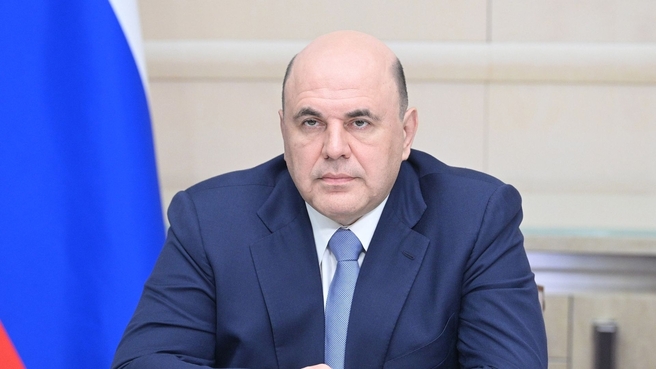The agenda: expanding the Project Funding Factory programme, facilitating the development of petrochemical clusters in the Russian Arctic.
Mikhail Mishustin’s opening remarks
Excerpts from the transcript:
Mikhail Mishustin: Good afternoon, colleagues,The Government continues to create a comfortable environment for the development of business initiatives and business operations and to distribute risks between investors and the state. For this purpose, we are adjusting corporate support measures.One of them is called the Project Funding Factory. This programme, involving the VEB.RF development institution, has proved to be highly effective in the conditions of sanctions pressure. Today, as part of this programme, we are implementing 25 investment projects worth over 1.5 trillion roubles in high-priority economic sectors, and we have approved eight more projects worth about 400 billion roubles.We have signed a resolution on expanding the potential of this mechanism. We will extend a measure approved on the President’s instructions and allowing investors to reduce the share of their own contributions until late 2024. The share of this involvement has been reduced to 15 percent. We will establish shareholding capital funds using VEB.RF investment and that from other banks; these funds will provide from 5 to 10 percent of project allocations.If a company has borrowed funding at another loan agency under more profitable terms, it will be able to replace VEB.RF financial resources with its guarantees.We also softened requirements for borrowers. From now on, they will be able to implement projects at operational enterprises without setting up a new company. We hope that these measures will make project funding more affordable and will provide extra loans for organisations that create promising advanced production facilities.Here is another issue. Substantial areas of this country are located in Arctic latitudes containing large mineral resources, including oil and gas. The President has emphasised the importance of establishing modern resource-processing enterprises.As per the President’s instruction, we are expanding support for the development of petrochemical clusters in the Russian Arctic in direct proximity to mineral deposits. This decision will provide a multiplier effect for a number of affiliated sectors, and will also facilitate long-term economic growth. We have approved the relevant roadmap.
Mr Novak, please tell us, in
greater detail, how this work will be organised.
Alexander Novak: Mr Mishustin, colleagues,
The petrochemical industry products, including all sorts of items, equipment, and consumer goods made of plastic, are used in daily life and in the manufacturing industry’s most advanced high-tech sectors.
A significant portion of petrochemical products continues to be imported and it is critically important to substitute these imports. To do this, it is necessary to expand the production of large-, medium- and small-tonnage refined products and to ensure technological sovereignty in this segment of industry.
The Government has put in place a range of incentives to facilitate the implementation of petrochemical projects. The Tax Code has been amended to include a reverse excise tax on ethane and liquefied hydrocarbon gases.
In 2021-2022, the Energy Ministry signed five investment agreements to create new refineries with major enterprises, such as Kazanorgsintez, Nizhnekamskneftekhim, ZapSibNeftekhim, Ufaorgsintez and the Caspian Innovation Company.
Major projects to build petrochemical plants in Ust-Luga, Blagoveshchensk, the Amur Region and Ust-Kut, the Irkutsk Region, with a total investment of over 3 trillion roubles, are being implemented outside investment agreements, based on the newly introduced support measures in the form of a reverse excise tax on ethane and liquefied petroleum gas which boosted the output of large-tonnage polymers by 25 percent to a total of 7.5 million tonnes in just three years and set us free from dependence on large-tonnage polymer imports.
Mr Mishustin, as you noted earlier, on behalf of the President, the Government approved an updated roadmap for expanding the petrochemical complex on 16 May. This now includes measures to expand the transport and logistics infrastructure and to localise equipment, a pilot project to introduce commercial oil and lubricant labelling and the creation of additional mechanisms to promote the development of petrochemical clusters, including in the Arctic and in the Far East.
Training highly skilled employees for the petrochemical industry has been included in the roadmap as well.
A comprehensive programme to develop the Yamal Peninsula’s resource potential will be drafted in order to develop a resource base for the petrochemical industry.
The roadmap targets, including a 34 percent increase in the production of large-tonnage polymers by 2025, have been approved.
Mr Mishustin, colleagues,
Once implemented, the measures envisaged by the Government resolution will make it possible to allocate additional funds to implementing projects for the production of small- and medium-tonnage petrochemical products with high added value, to ensure the substitution of imported refined products on the domestic market, and to promote non-primary resource and non-energy exports under the International Cooperation and Export national project.
Mikhail Mishustin: Thank you, Mr Novak.
Russia boasts a significant research and industrial potential which relies on the research conducted by Russian researchers. It is important to make the best use of their work in order to fortify our country’s technological sovereignty.
Please keep an eye on this matter.













